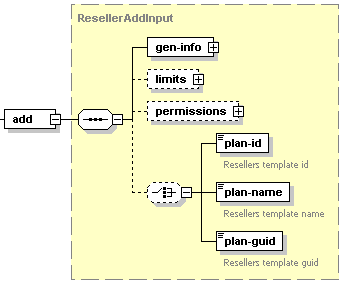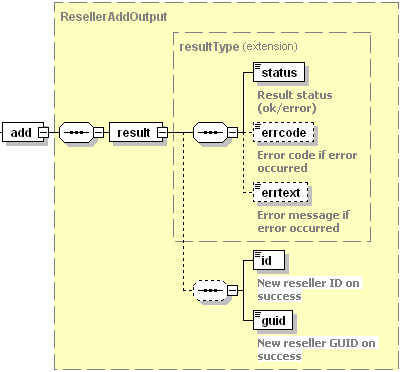Creating Reseller Accounts
The add operation is used to create reseller accounts.
A reseller account presents personal information on a reseller and a collection of various settings. These settings are as follows:
- Limits policy and limits on using Plesk resources
- Permissions on using Plesk resources and managing own services
- Application pool settings
The personal information is always specified when a reseller account is created, while the settings can be specified later. The only exception is a reseller plan. It can be applied only when creating a reseller account. To learn more about reseller plans, refer to the Managing Reseller Plans section.
Request Packet Structure
A request XML packet adding a new reseller to Plesk, includes the add operation node:
<packet>
<reseller>
<add>
...
</add>
</reseller>
</packet>
The add node is presented by the ResellerAddInput complex type
(reseller.xsd). Its graphical representation is as follows:

Note: The interactive schema navigator for all request packets is available here: http://plesk.github.io/api-schemas/1.6.9.1/agent_input.svg.
- The gen-info node is required. It specifies general information
on a new reseller account. Data type: ResellerAddGenInfo
(
reseller.xsd). To view the structure of this node, refer to the Type ResellerAddGenInfo section. - The limits node is optional. It specifies limits on using Plesk
resources and limits policy for a new reseller. Data type:
resellerLimits (
reseller.xsd). To view structure of this node, refer to the Limits section. - The permissions node is optional. It specifies reseller’s
permissions on using Plesk resources and managing own services. Data
type: clientPerms (
plesk_client.xsd). To view structure of this node, refer to the Permissions section. - The plan-id node is optional. It specifies a reseller service
plan ID. Data type: id_type (
common.xsd). - The plan-name node is optional. It specifies a reseller service plan name. Data type: string.
- The plan-guid node is optional. It specifies a reseller service plan guid. Data type: string.
Note: When creating request packets, put nodes and elements in the order they follow in the packet structure.
Response Packet Structure
The add node of the response packet is structured as follows:

Note: The interactive schema navigator for all response packets is available here: http://plesk.github.io/api-schemas/1.6.9.1/agent_output.svg.
- The result node is required. It wraps the response retrieved
from the server. Data type: resultType (
common.xsd).- The status node is required. It specifies the execution status
of the add operation. Data type: result_status
(
common.xsd). Allowed values:ok|error. - The errcode node is required if the add operation fails. It returns the error code. Data type: unsignedInt.
- The errtext node is required if the add operation fails. It returns the error message. Data type: string.
- The id node is required if the add operation succeeds.
It returns ID of the created reseller account. Data type:
id_type (
common.xsd). - The guid node is required if the add operation succeeds. It returns global unique identifier of the created reseller account. Data type: string.
- The status node is required. It specifies the execution status
of the add operation. Data type: result_status
(
Operation-specific Errors
1024 - License limits are reached.
Creating a reseller account with the minimum of settings:
The following packet creates a reseller account with the minimum of settings:
<packet>
<reseller>
<add>
<gen-info>
<pname>John Doe</pname>
<login>JDoe</login>
<passwd>sample</passwd>
</gen-info>
</add>
</reseller>
</packet>
Response:
<packet>
<reseller>
<add>
<result>
<status>ok</status>
<id>3</id>
<guid>f3cb0163-8fc2-4192-9921-98abd25d9cc2</guid>
</result>
</add>
</reseller>
</packet>
Creating a reseller account basing on the common plan settings
The following packet creates a reseller account basing on the common plan settings.
<packet>
<reseller>
<add>
<gen-info>
<cname>LogicSoft Ltd.</cname>
<pname>John Doe</pname>
<login>JDoe</login>
<passwd>Jhtr66fBB</passwd>
<status>0</status>
<phone>416 907 9944</phone>
<fax>928 752 3905</fax>
<email>host@example.com</email>
<address>105 Brisbane Road, Unit 2</address>
<city>Toronto</city>
<country>CA</country>
</gen-info>
<plan-name>common</plan-name>
</add>
</reseller>
</packet>
Response:
<packet>
<reseller>
<add>
<result>
<status>ok</status>
<id>3</id>
<guid>f3cb0163-8fc2-4192-9921-98abd25d9cc2</guid>
</result>
</add>
</reseller>
</packet>
Creating multiple reseller accounts
To create multiple reseller accounts, use a separate add operation for each:
<packet>
<reseller>
<add>
<gen-info>
<cname>LogicSoft Ltd.</cname>
<pname>John Doe</pname>
<login>JDoe</login>
<passwd>Jhtr66fBB</passwd>
<status>0</status>
<phone>416 907 9944</phone>
<fax>928 752 3905</fax>
<email>host@example.com</email>
<address>105 Brisbane Road, Unit 2</address>
<city>Toronto</city>
<country>Canada</country>
</gen-info>
</add>
<add>
<gen-info>
<cname>TechnoSoft Ltd.</cname>
<pname>Richard Roe</pname>
<login>RRoe</login>
<passwd>Jk8Dhh6fBB</passwd>
<status>0</status>
<phone>416 907 3366</phone>
<fax>928 752 3377</fax>
<email>james@example.com</email>
<address>122 Greenroad Valley, Unit 1</address>
<city>Toronto</city>
<country>Canada</country>
</gen-info>
<plan-name>base_plan</plan-name>
</add>
</reseller>
</packet>